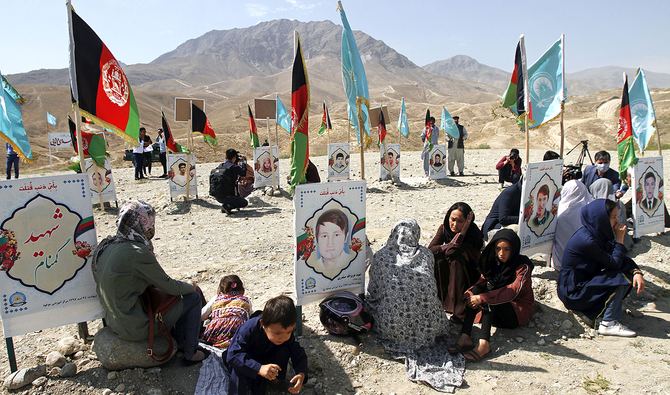DHAKA: With anguish in his voice, Baz Mohammad Timoory recalls the night when 13 of his family members, including his mother, were killed in an air raid on the outskirts of Afghanistan’s northern Kunduz province.
It has been a year and a half since the attack, but the 30-year-old laborer still does not know if the strike was conducted by the Afghan government or US-led troops stationed in the country.
“It’s not easy to see the deaths of your brother, nephews, nieces, mother and sisters,” he told Arab News from Kunduz, a lush agrarian province which lies 340 km north of Kabul. But with the government and Taliban negotiators holding talks in Doha to end decades of conflict in the war-ravaged country, Timoory said he is ready to “forgive and forget the past.”
He added: “I am not after taking revenge. I want the two sides to find a solution for bringing peace to Afghanistan.”
Timoory is not the only person who shares that sentiment.
According to a UN report released in February, 100,000 Afghans have died in the conflict since 2009.
The global body conceded that the number could be much higher if it included civilian deaths from previous conflicts.
“We want an end to the war in the country, so others live in security, harmony and no more children become orphans and mothers widows,” said Bashir Ahmad.
He is the eldest son of police officer Nasir Ahmad, who was killed in a Taliban attack three weeks ago, his family said.
The Ahmads are part of a group of victims and survivors who said they are ready to “forgive” the Taliban, provided they “choose the path of peace.”
Others have urged the “restoration of justice” and punishment for Taliban members.
“Victims of war warn that without a proper mechanism to address widespread past violations, in the best scenario, we will have a fragile peace. At worst, the conflict will resume after a brief pause,” said a statement by the group.
The statement, addressed to both sides in the Doha talks, was released in Kabul last week ahead of the negotiations which began on Saturday behind closed doors.
The talks are expected to be long and complicated as the two sides struggle to end the fighting and protect the rights of women and minorities. There are 42 negotiators from both teams, including five women on the Kabul government’s side, but there is no one representing the victims’ families.
When questioned on their exclusion from the talks, Fawzia Koofi, a female government negotiator, said: “It is not clear if the team will remain the same until the end of the talks or change. With time, there might be additions and changes.”
The long-awaited talks are based on an agreement signed between the US and the Taliban in February this year in Qatar, where the Taliban have had their political office since 2013.
Initially scheduled to take place on March 10, the intra-Afghan talks faced several rounds of delays, mainly due to a hold up in the release of about 5,000 Taliban prisoners in exchange for government hostages held by the militant group.
Afghan President Ashraf Ghani was slow to release the remaining 320 Taliban prisoners who were accused of serious crimes by several countries, including France and Australia.
Meanwhile, there are accusations that government and US-led operations against the Taliban led to civilian deaths.
Human rights campaigners have called for civilian “voices to be heard” during the Qatar dialogue and said that the ongoing talks and the February accord fail to protect victims’ rights.
Lal Gul Lal, chief of Afghanistan’s Human Rights Organization, a body funded by donors, said: “About 600,000 civilians have been killed in the past 19 years.
“Failure to address past atrocities, killings and to restore justice has been one of the main reasons for the continuation of the crisis and failure of past peace deals in Afghanistan,” he said, in reference to the former Soviet Union’s withdrawal from Afghanistan in the 1980s. Subsequent peace deals were prepared, but soon fell apart.
“If we want justice, it is for the sake of peace; both are interdependent. The voices of victims should be heard,” he told Arab News.
In the 2001 Bonn deal, signed after the Taliban was removed from power, there was a push for transitional justice, but “due to foreign and domestic pressures and interests, it was never implemented in Afghanistan,” Lal said.
Sharzad Akbar, chairperson of the government-appointed Independent Human Rights Commission, said victims should be given a platform to address their grievances, and their “suffering should be acknowledged and humanitarian needs addressed during the talks.
“We recognize all civilian victims of conflict, from violence including suicide attacks, air strikes, night raids, roadside bombs and more. This is not only the requirement of international law and good practice, but also a duty of the negotiation teams and a right of victims in Islam,” she said.



























